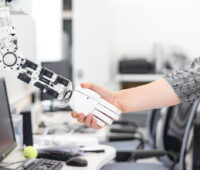

As technology advances rapidly, it is now possible to take care of patients in fractions of a second. The biggest issues across the globe are diseases and medicines, which no one has an answer to. As people live longer, there are chances of them getting sick more often or even after they turn 100 years old. For this reason, research for finding the right medicine and developing it is of utmost necessity. The following are some of the leading technologies in the healthcare industry today.
- Artificial Intelligence
Artificial intelligence, or AI, is a machine that makes human lives easier and better. Machines programmed with artificial intelligence work faster than humans and do not tire easily. It would be helpful when diagnosing patients because it processes information much more quickly than humans. Also, AI technology has access to all information in the world which could also assist doctors in knowing the best treatment for their patients.
- Blockchain Technology
Blockchain technology is a public ledger containing information of all transactions made within it since its creation. The data contained in blockchains do not get altered, and there are several security measures to protect the system from unauthorized users such as hackers. This makes blockchain an efficient option when it comes to medical records. Blockchain technology has been implemented in the healthcare industry to exchange patients’ data across doctors and hospitals to facilitate a better diagnosis and treatment system.
- Virtual Reality
Virtual reality is the simulation of a three-dimensional image or environment that one can interact with using special electronic equipment such as helmets and gloves. It uses computer technologies to generate realistic images, making it very useful in healthcare, especially in mental health. Virtual reality therapy helps patients who have anxiety disorder, phobias, and depression by recreating a virtual world for them to engage in.
- Smarter Pacemakers
Pacemakers are electronic devices implanted in the body to monitor the heartbeat and make necessary corrections when needed. It is a small device that sends electrical pulses to the heart and regulates its beating. Smarter pacemakers can be controlled remotely, making it easier for doctors to monitor their patients’ conditions.
- Better Treatment Methods
The healthcare industry has now taken over using 3D stem cell printing to develop tissues and organs of humans for transplants. The use of artificial intelligence in the medical field is applied in the analysis of X-rays, CT scans, and MRI images to investigate fractured bones, tumors, and other health issues. Also, wearable technologies are being used to monitor people’s progress in recovering from diseases, making the process faster.












Leave a Reply
Be the First to Comment!
You must be logged in to post a comment.
You must be logged in to post a comment.